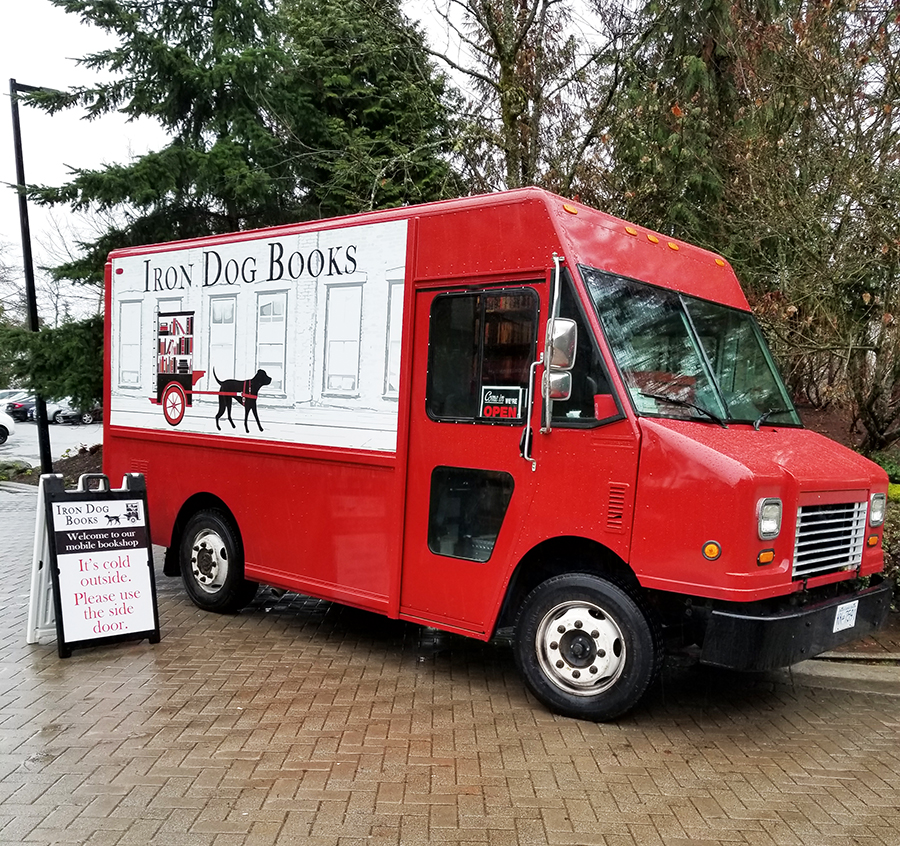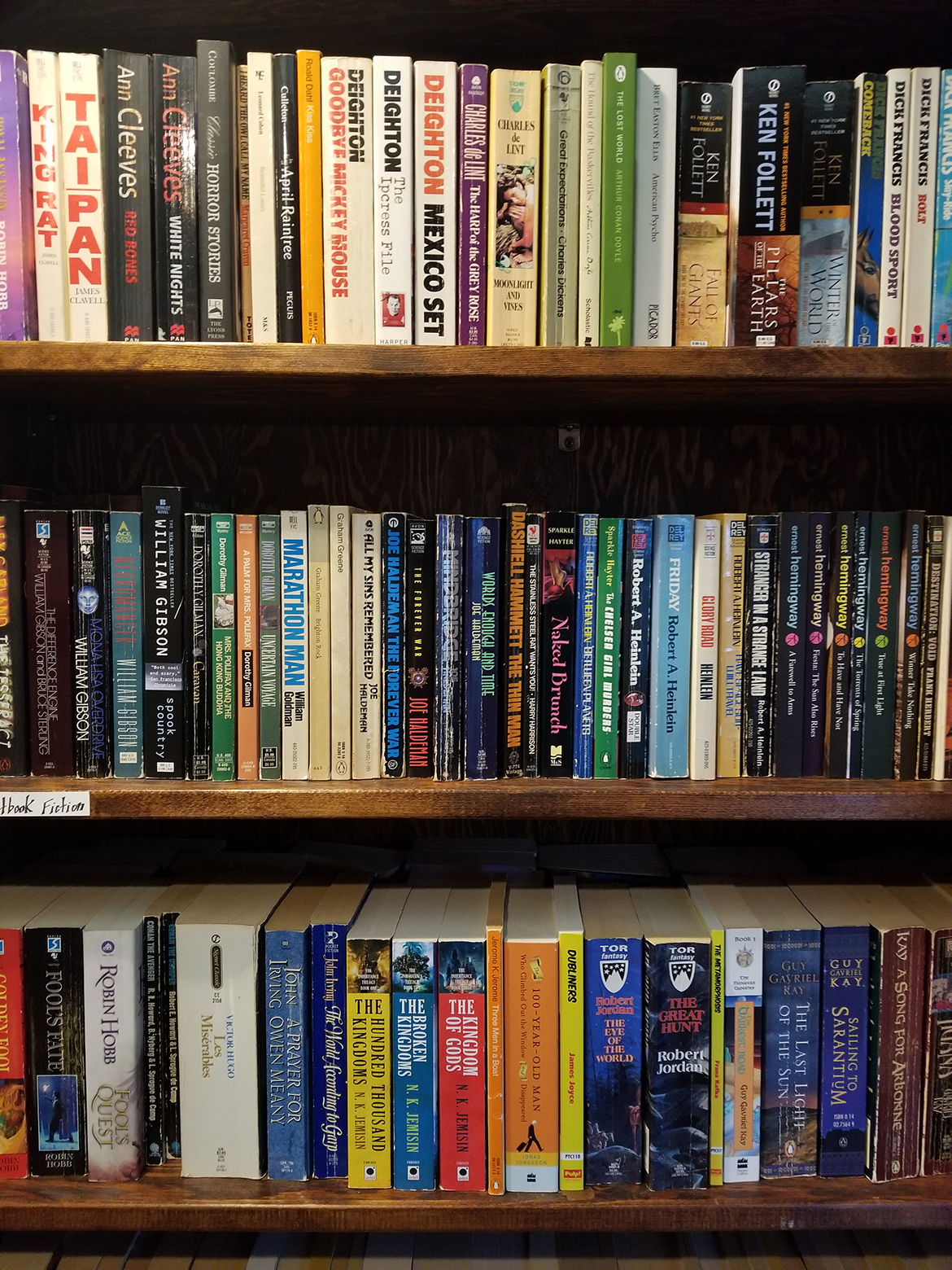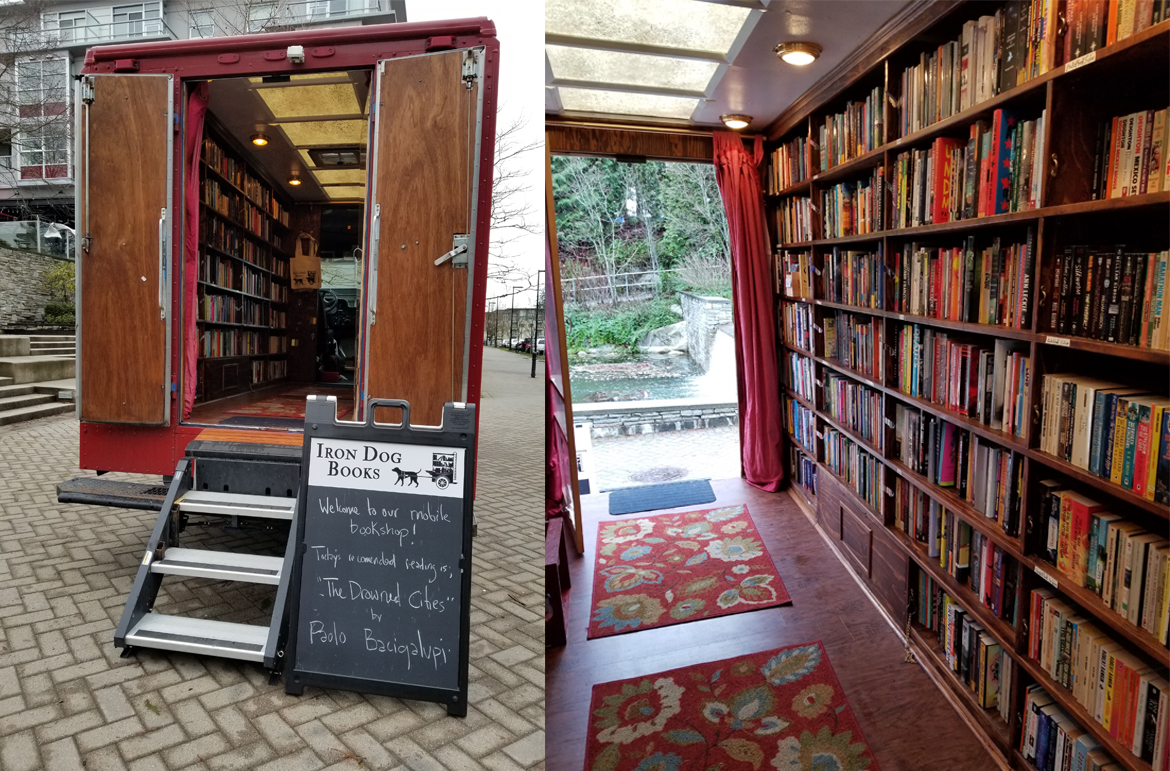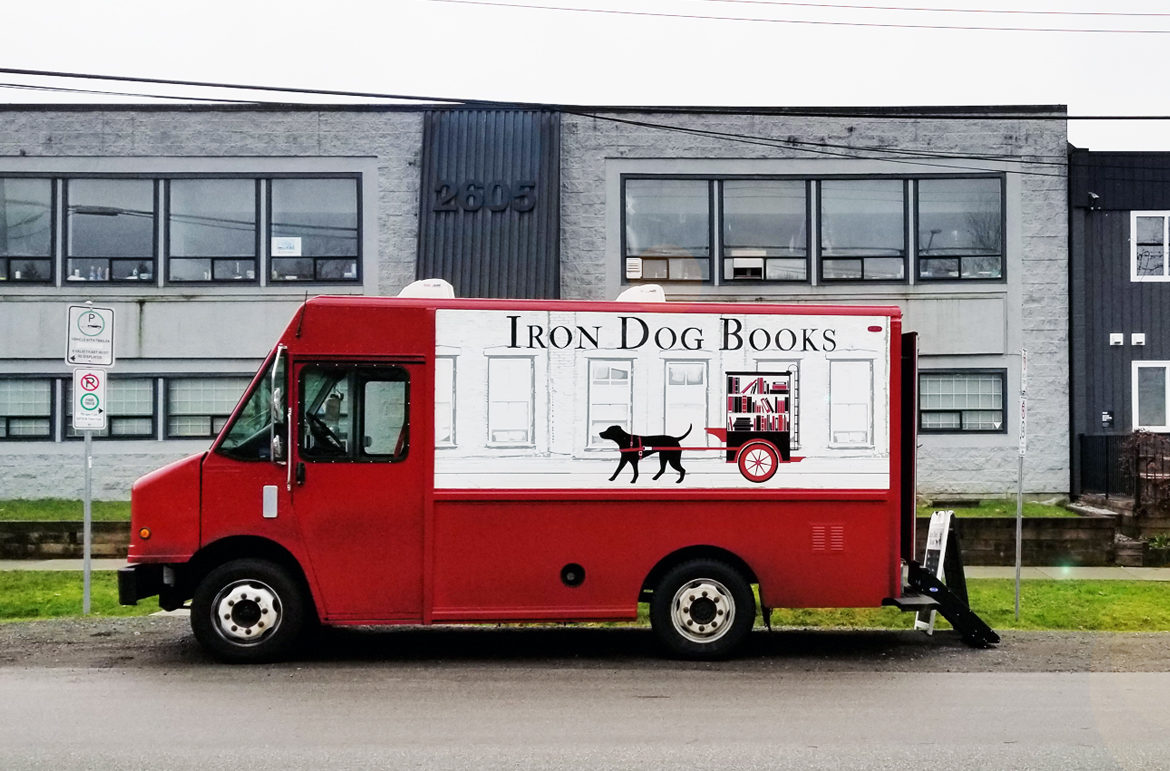We are used to food trucks and pop-up shops, and some communities have mobile libraries, but Iron Dog Books is the first mobile bookstore we’ve heard about—and we’re excited.
Established by Hilary Atleo, Iron Dog Books sells new and used books and is dedicated to bringing low-cost reading to Tsleil-Waututh, Sḵwx̱wú7mesh, and Musqueam territories in the Lower Mainland. We got the chance to ask Hilary some questions about the bookstore, their business, and her motivations.
How did you get started as a bookseller?
In 2010 my husband decided to attend the University of Alberta to earn his PhD. At the time I was in my mid-twenties and had worked a very wide variety of jobs. I felt it was important to cultivate portable skills—the sort of career that would allow me to move as my husband’s academic career moved, but still have some sense of continuity. I applied to the Wee Book Inn in Edmonton when we arrived there and worked there in various capacities until 2012. In 2012 we moved to Victoria and I was hired at Russell Books, one of Canada’s largest new and used bookshops. It was incredibly valuable training for owning my own bookshop.
Tell us about the history behind Iron Dog Books.
When I worked at the Wee Book Inn in Edmonton my co-workers and I somehow developed this absurd ongoing daydream of a mobile bookshop. We would throw out different ideas for how it would work, debating the merits of various vehicles and business models. I never thought of it as anything more than a humorous fantasy until we moved to Vancouver in the summer of 2016.
After our second child was born in 2014 I had made a goal of owning my own shop within five years, but moving to Vancouver threw into sharp focus all the barriers I was facing. Managing childcare, a commute, the high cost of retail leases, not to mention the fact that we may decide to move again in the future, it all added up to make opening an ‘immobile’ shop extremely risky. One night I said to my husband “What if I decided to be serious about putting the bookshop in a truck?” He was very supportive and had a lot of creative ideas to make it work.
Can you tell us a bit about your community, customers, and what makes them special?
We live at the top of Burnaby mountain, in a very small town right next to Simon Fraser University. There are currently about 5,000 people living in the town, and I understand that the goal is to have 10,000 residents by the time the development is complete. There is a strong sense of community identity, and the people who live here love living here and are genuinely kind and considerate to their neighbours. In addition, the academic community from SFU is full of critical thinkers who are always asking for great books and bringing their unique tastes to the shop. It is a fantastic mix of ideologies that makes stocking the store so much more collaborative.

How do you organize the store and the shelves? Just by straight genre or thematic areas based on your customers’ interests?
The shop is so small—only 70 square feet—that we have had to be extremely pragmatic in the way we shelve and sort our books.
We have all of our adult fiction shelved together, it is not sorted by genre at all. Adult fiction takes up about a third of our shelf space. Picture books take up another third, young adult and middle readers is a sixth, and non-fiction is a sixth.
The only section I have broken into genres is non-fiction, and that is dictated largely by the most popular areas with our customers. For example, philosophy is not a terribly large section, perhaps 10% of non-fiction, but we keep it in its own section because it is so popular. On the other hand, we have a section titled ‘Cultural Studies’ that includes history, sociology, writings on the environment—it is a condensed section of some of the best books in those genres.
Do you have a favourite section?
This is a difficult question to answer! If I take a step back from my love of picture books, or my joy at putting unusual and profound non-fiction on the shelves, my favourite section in our shop has to be pocketbook fiction. We shelve all our pocketbook fiction together, regardless of genre, and nowhere else can you have the happy serendipity of finding Anne Cleeves shelved next to James Clavell, or Robin Hobb next to Victor Hugo, or William Gibson next to Dorothy Gilman, and paying less than $6 for any of them. Our pocketbook section is driven by a philosophy of literary egalitarianism; all sections are equally valuable, and customers should be able to purchase a book regardless of their socio-economic status.

Do you have a favourite time of year as a bookseller?
I love all the busy times, but my favourite moments happen in the slow season in winter. After the holiday rush is over but before the spring and travel and vacations begin. During that season people look for books in a very thoughtful way. They are shopping for themselves generally, and they tend to spend more time in the bookshop, browsing and thinking and making careful choices. They may purchase fewer books but they are purchasing books they have a real connection too. That is the best part of bookselling – connecting people to the idea or story they are looking for.
What’s the strangest request you’ve had?
I can honestly say that I don’t tend to think of people’s requests as strange at all because they all seem to reflect an honest part of that person’s life. It takes a lot of courage to walk into a shop and share an intimate part of your experience with someone, whether the customer needs books on death or sex or another topic that is outside conventional polite conversation. I once had a conversation with someone who believed Malcolm X was a superhero—I mean, someone who didn’t know who he was and made an assumption. A superhero based on Malcolm X actually sounds pretty great, to me.
Which book do you think is underappreciated?
She is very highly regarded, so perhaps underappreciated isn’t the right word, but Lee Maracle is definitely under-read. Her books about Indigenous lives and experiences in the Pacific Northwest rival any in the Indigenous canon, and yet only some of her titles are still in print, and almost none are widely available. With the quality of her writing and the deep urgency of her themes, she should be one of Canada’s most well-known authors. Ravensong is perhaps the most available book of her fiction, and she just released a book called My Conversations With Canadians that needs to sell as many copies as The Inconvenient Indian by Thomas King.

Can you tell us about some of your projects and initiatives?
Our primary objective for 2018 is to build relationships with the community events around Metro Vancouver that could benefit from having a mobile bookshop. In addition, we are planning a small trip that brings the bookmobile to Vancouver Island, as a test-run for a bigger sojourn in summer 2019.
We also launched our own line of cards and journals. We print the cards and journals locally and pay our artists 10% of the retail price of everything we print. We are very serious about paying fairly for work and making sure that the people we work with can afford to keep working as artists.
Finally, when people donate their books to the store 20% of the retail value of their books goes to rural and remote Indigenous schools to fund library and classroom resources. We are gearing up to make our first donation in the next month or so. My husband and I are both native and it was very important to us to contribute to our community, even though we live far away in Vancouver.
What is your favourite part of being an independent (mobile!) bookstore?
My favourite part of being mobile is the ability to reach areas that are underserved by bookshops. There is a whole spectrum of factors that contribute to the decline of independent bookshops, and our model lets us disrupt many of those factors. Literature should be affordable and accessible, and independent bookshops provide a crucial space for public discourse. Independent booksellers both reflect and challenge the dominant paradigms of the day; we serve the needs and tastes of our whole community, in all its diversity. Connecting people to the books they didn’t know they needed is the most rewarding part of selling books.
In early 2018, you can find Iron Dog Books on Tuesdays and Thursdays from 9:00 a.m.–6:00 p.m. at SFU Burnaby’s Town Square next to Cornerstone. On Saturdays the truck is in Port Moody near Brewery Row and Meat Craft butchers. They also attend local special events like Heritage Days in Port Moody next weekend, Saturday, February 17. Check @irondogbooks on Instagram for location specifics and keep an eye out for them at local events later this year like the Fraser Valley Food Truck Festival and Car Free Day.


One reply on “Iron Dog Books: a mobile book community in only 70 square feet”
ooooh I’m one of her regulars!!!! she is very nice and helpful!